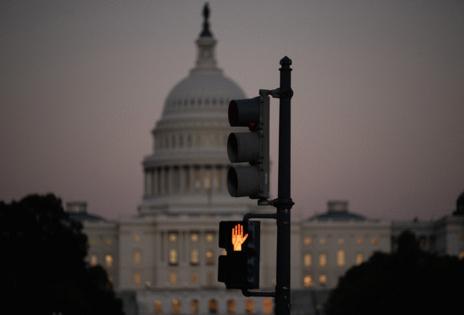House is poised to approve measure to end longest government shutdown in U.S. history
Published in Political News
WASHINGTON — The longest government shutdown in U.S. history was poised to come to an end Wednesday as the House finalized a vote on a spending package that President Trump was ready to sign into law as soon as it reached his desk.
"President Trump looks forward to finally ending this devastating Democrat shutdown with his signature, and we hope that signing will take place later tonight," White House press secretary Karoline Leavitt said at a press briefing earlier on Wednesday.
The president's signature will mark the end of a government shutdown that for 43 days left thousands of federal workers without pay, millions of low-income Americans uncertain on whether they would receive food assistance, and travelers facing delays at airports.
The vote, which began Wednesday evening, also was a cap to a frenetic day in Capitol Hill in which lawmakers publicly released a trove of records from Jeffrey Epstein's estate and welcomed the newest member of Congress, a Democrat from Arizona who was key in forcing a vote to demand the Justice Department release all the Epstein files.
The spending package, when signed by the president, will fund the government through Jan. 30, 2026, and reinstate federal workers who were laid off during the shutdown. It will also guarantee backpay for federal employees who were furloughed or worked without pay during the budget impasse.
The package does not include an extension to Affordable Care Act healthcare tax credits that are set to expire at the end of the year — a core demand Democrats tried to negotiate during the seven weeks the government was shut down.
Ahead of the floor vote, House Democrats were steadfast in their opposition to a deal that did not address the lapsing healthcare subsidies.
"We are not going to support a partisan Republican spending bill that continues to gut the healthcare of the American people," House Minority Leader Hakeem Jeffries said.
If the tax credits expire, premiums will more than double on average for more than 20 million Americans who use the healthcare marketplace, according to independent analysts at the research firm KFF.
Another point of contention during the floor debate was a provision in the funding bill that will allow senators to sue the federal government if their phone records are obtained without them being notified.
The provision, which is retroactive to 2022, appears to be tailored for eight Republican senators who last month found their phone records have been accessed as part of a Biden-era investigation into the attack on the U.S. Capitol by Trump supporters on Jan. 6, 2021.
If they successfully sue, each violation would be worth at least $500,000, according to the bill language.
Sen. Lindsey Graham (R-S.C.), one of the senators whose phone records were accessed, said Wednesday he will "definitely" sue when the legal avenue once it becomes available.
"If you think I'm going to settle this thing for a millions dollars? No. I want to make it so painful, no one ever does this again," Graham told reporters.
Several Democrats slammed the provision on the House floor. Rep. Alexandria Ocasio-Cortez of New York said it was "unconscionable" to vote in favor of the spending bill with that language tucked in.
"How is this even on the floor? How can we vote to enrich ourselves by stealing from the American people?" she said.
Some House Republicans were caught off guard by the provision and said they disagreed with the provision. The concern was enough to get Speaker Mike Johnson to announced that House Republicans will plan to fast-track legislation to repeal the provision next week.
Epstein files loomed large over vote
The House began voting on the bill after Johnson swore Adelita Grijalva (D-Ariz.) into office, after refusing to do so for seven weeks.
When Grijalva walked into the House floor and was greeted with applause by colleagues cheering her name, she immediately called out Johnson for delaying her taking the oath of office.
"One individual should not be able to unilaterally obstruct the swearing in of a duly elected member of Congress for political reasons," Grijalva said, while equating the decision to "an abuse of power."
After finishing her remarks, the Democrat immediately signed a petition to force a House floor vote demanding the full release of the Justice Department's files on Jeffrey Epstein.
Her signature was the final action needed to force a floor vote. The move is sure to reignite a pressure campaign to release documents tied to Epstein, just hours after House Democrats and Republicans released a trove of records from the Epstein estate.
The documents included emails from the late sex trafficker that said Trump had "spent hours" with a victim at his house and Trump "knew about the girls."
"Justice cannot wait another day," Grijalva said.
In a social media post Wednesday, Trump accused Democrats of trying to use the "Jeffrey Epstein Hoax" as a distraction from their failed negotiations during the government shutdown.
"There should be no deflections to Epstein or anything else, and any Republicans involved should be focused only on opening our Country, and fixing the massive damage caused by the Democrats!" Trump wrote.
©2025 Los Angeles Times. Visit at latimes.com. Distributed by Tribune Content Agency, LLC.
























































Comments